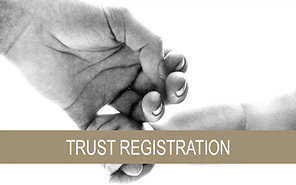Proposed Trustees and settlers:
- PAN Card
- Aadhar Card.
- Aadhar Card/Voter id/Driving Licence - Two Witness
- Mobile number and Mail id
Register Office documents:
- If the office is rental, a rental agreement is essential for Trust registration.
The primary goal of a trust is to serve as a non-profit organization benefiting society. A minimum of two trustees is required for trust creation, with no maximum limit. Settlers cannot serve as trustees, and they must be Indian residents. The trust is formalized through a trust deed outlining its objectives and regulations. Solubilis offers trust registration in India, providing expert guidance throughout the registration process and beyond. Our services are cost-effective, ensuring accessibility for all.

Step 1: Name application:
File an application to reserve the company name with the registrar. The applicant can provide two names with one resubmission.
Step 2: Name Approval / Rejection:
Upon application receipt, CRC may approve or reject the name.
Step 3: settlers and trustees:
Select trustees in the trust registration online. Minimum two persons are required, with no maximum limit. Settlers must be Indian residents.
Step 4: draft a trust deed, MOA
Prepare a trust deed on stamp paper, outlining rules and administration. The MOA is mandatory, detailing trust members and objectives.
Step 5: trust deed submission with registrar:
Submit the certified trust deed copy with the local registrar. Settlers must sign every trust deed page.
Step 6: receiving the registration certificate:
Once formalities are complete, the registrar issues the Trust registration certificate.
Draft a trust deed outlining rules and administration guidance on a stamp paper.
Provide proof of identity and address for trustees and settlers.
Obtain a No Objection Certificate (NOC) if the office is rented.
Submit the registration copy of the property for verification.
A trust can be established with a minimum of two members and a maximum of 21 members
Under Section 4 of the Indian Trust Act 1882, trusts can be created for lawful purposes. A trust requires a written document, signed by trustees or a sole trustee, and can also be established through a will. There's no specific form for trust creation, but the objectives must be clear and unambiguous.
According to Section 7 of the Indian Trusts Act 1882, a trust can be formed by a person capable of making a contract. Additionally, a trust can be established on behalf of a minor with the permission of the Civil Court.
As per Section 78 of the Indian Trusts Act 1882, a trust can be cancelled on specific grounds. Trustees hold the authority to cancel the trust at their discretion. Alternatively, if the trust deed includes provisions for cancellation, it can be revoked accordingly. In cases where the trust is created by the author to repay a debt, and this information is not conveyed to the creditor, the author retains the right to cancel the trust.
Yes, modifications can be implemented through a rectification or supplementary deed.
A trust typically consists of three key positions: President, General Secretary, and Treasurer. In certain instances, a Vice President may also be included in the structure.
Online Meeting
Instant Online Meeting